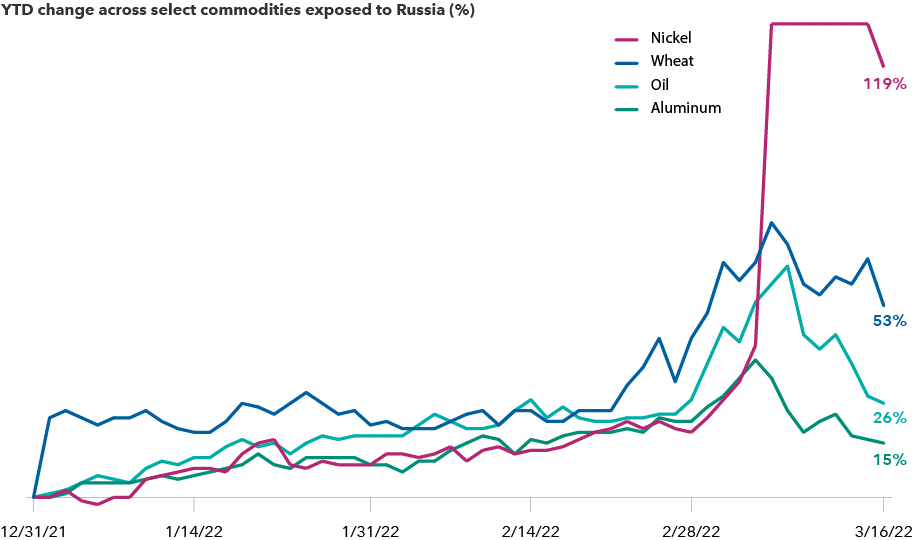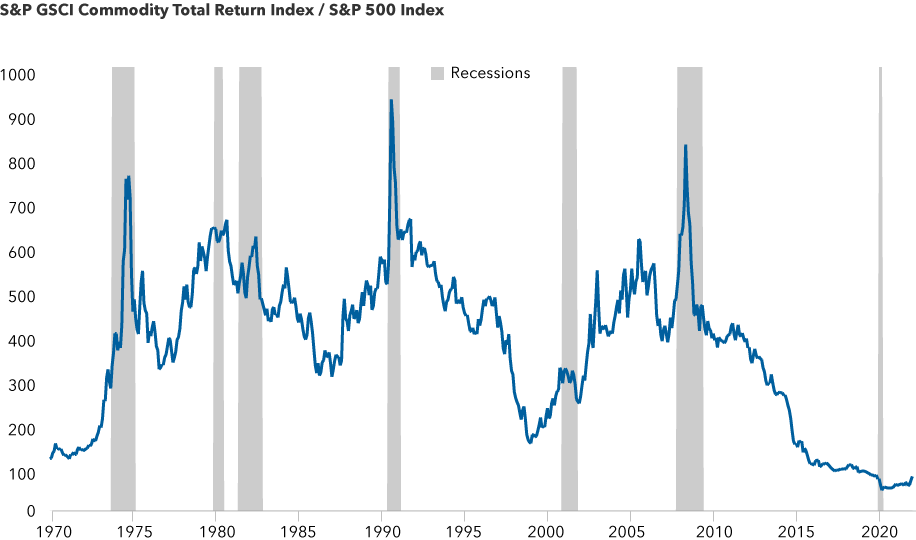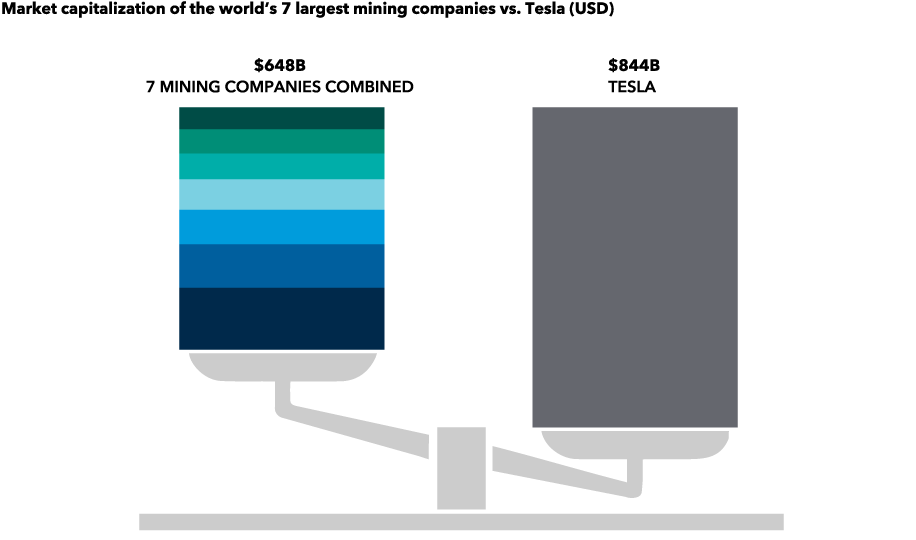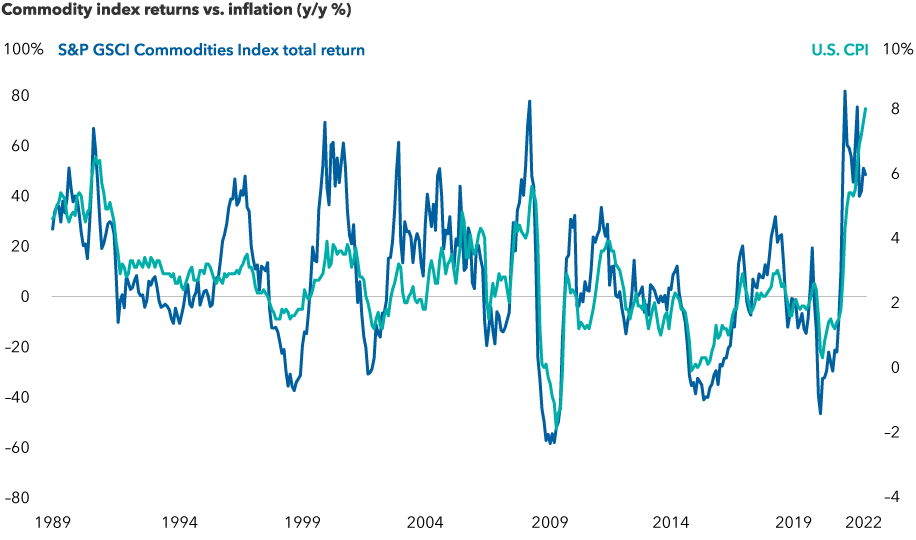Inflation
For a glimpse of just how volatile commodities currently are, look at nickel markets. Prices doubled in early March. Then they fell sharply. Then the London Metals Exchange halted trading. This week, the market for nickel — a key component in electric vehicle batteries and stainless steel products — reopened but with strict trading limits.
It’s just one example of how the global economy is being disrupted by Russia’s invasion of Ukraine. Russia provides about 20% of the world’s nickel supply. The threat of losing it roiled trading markets and sent buyers scrambling for other sources.
Commodity prices skyrocket amid the Russia-Ukraine conflict

Sources: Capital Group, London Metal Exchange, Refinitiv Datastream, U.S. Department of Agriculture. As of March 16, 2022.
Commodity prices have climbed sharply since the February 24 invasion, especially for materials produced in Russia and Ukraine. That includes wheat, oil and natural gas, as well as other key metals such as aluminum, palladium and copper.
But prices were rising long before the start of the conflict, contributing to inflationary pressures not seen since the early 1980s. So, the crucial question for investors is: Are these price spikes sustainable?
“In the short term, the answer is no,” says equity portfolio manager Lisa Thompson. “The market has overreacted, and we’re already seeing prices come back down a bit. But, compared to where we were a year ago, commodity prices are significantly higher — and I do think that’s a durable trend.”
“Over the long term,” Thompson adds, “prices are likely to remain elevated due to a number of factors, including rising demand, supply shortages and deglobalization forces symbolized by the war in Ukraine and strained U.S.-China relations. Higher prices should be expected in a world where free and open trade is in retreat.”
Metals industry poised to shine
From an investment perspective, this has clear implications for the metals & mining sector. It has been a neglected area of the market for more than a decade — even longer if you exclude the last major price spike during the 2008 global financial crisis.
The sector has been undervalued for years and remains so today despite a recent rally in mining company stocks, says Douglas Upton, a Capital Group equity analyst who has covered commodity markets for more than 30 years. Upton thinks many commodity prices will remain high for years due to chronic underinvestment by the industry since 2015. The problem is exacerbated by the fact that it takes more time than it did in the past to launch new mining projects.
“It’s a multiyear process,” Upton explains. “Discovery, permitting and funding all take much longer. In price terms, that points to higher highs and higher lows until new investments start to produce results.” This dynamic doesn’t apply to food and other crops, Upton notes, because production in those areas can be ramped up much faster.
Historically speaking, commodities are cheap relative to U.S. stocks

Sources: Capital Group, Refinitiv Datastream, Standard & Poor's. The price ratio, between the S&P GSCI Total Return Index and the Standard & Poor’s 500 Composite Index is scaled to 100. Data shown from 2/27/70 to 2/28/22. In USD.
“All of the big mining companies are undervalued in my view,” he says. “The market is not thinking enough about the consequences of the underinvestment theme. Valuations, and consensus earnings estimates, assume that commodity prices will decline over the next few years, closer to historical averages. I think that is quite wrong.”
Case in point: Look at the market capitalization of the world’s seven largest mining companies. Even combined, they do not come close to the market value of a beloved new-economy company such as Tesla. The automaker needs certain refined metals, including nickel, to produce its lithium-ion batteries. So much so that Tesla CEO Elon Musk cited access to nickel as one of his biggest production concerns long before Russia invaded Ukraine.
Mining companies toil in obscurity despite key role in global economy

Source: RIMES. As of 3/16/22. Mining companies represented (from largest to smallest) include BHP, Rio Tinto, Vale, Glencore, Freeport, Anglo American and Newmont.
In addition to underinvestment, another factor that could lead to higher commodity prices over the long term is the worldwide push for sustainable energy sources, Upton adds. Electricity, in particular, has become a favoured resource. The expansion of the power grid — along with the rapid adoption of electric vehicles — will require lots of copper, nickel and other key metals.
China: A counterbalance to rising prices?
On the flip side, China’s slowing economy could act as a counterbalance to keep commodity prices in check. As the largest importer of raw materials, China consumes more than half the world’s iron ore, coal and copper supplies. When China’s economy slumps, the global commodities complex tends to sputter.
China’s close trading relationship with the European Union could also expose it to a wartime recession in Europe if the war in Ukraine drags on. Moreover, China is dealing with a COVID-19 resurgence that could further hamper the economy as the government renews restrictions on travel and entertainment.
“Even before the latest COVID outbreak, China’s economy was decelerating or at least stabilizing at a very low rate of growth,” says Stephen Green, a Capital Group economist who covers Asia. “Things are likely to get worse before they get better, and a sufficiently bad recession could cause commodity prices to fall.”
China’s central bank will probably cut interest rates soon, Green notes, while most other central banks around the world are moving in the opposite direction.
Investment implications: Inflation hedge
Regardless of where markets go from here, the current price surge confirms, once again, that commodities are an effective hedge against inflation. That’s not surprising since those very commodities — oil and gas, for instance — feed into many aspects of the global economy and can help to fuel inflation, which is currently running at a 40-year high.
Historically speaking, energy — especially oil — has moved closely in line with inflation, as measured by the U.S. Consumer Price Index. Since oil is usually a major component of commodity-related indices, the long-term correlation between commodity prices and inflation is high.
No surprise: Commodities are an excellent hedge against inflation

Sources: Capital Group, U.S. Bureau of Labor Statistics, Refinitiv Datastream, Standard & Poor's, U.S. Department of Labor. Data shown from 1/31/89 to 2/28/22. Returns are in USD. U.S. CIP based in USD.
However, it’s also important to note that there are big differences between major categories of commodities. Oil and gas, metals, food and agricultural products often follow their own cycles.
Investors seeking an inflation hedge should keep that in mind, says Capital Group economist Jared Franz. “It all depends on the source of the inflation,” he notes.
“Unsurprisingly, the energy sector tends to do well when inflation is rising because energy price increases, especially for gasoline, can be quickly passed on to consumers,” Franz says. “That’s not always the case with other commodities, where price increases can be absorbed as they move through the production chain.”
The U.S. Consumer Price Index (CPI) is a measure of the average change over time in the prices paid by urban consumers for a market basket of consumer goods and services.
The S&P GSCI Commodity Total Return Index is an index of commodity sector returns representing an unleveraged, long-only investment in commodity futures broadly diversified across the spectrum of commodities.
Standard & Poor’s 500 Composite Index is a market capitalization-weighted index based on the results of approximately 500 widely held common stocks.
Our latest insights
-
-
-
U.S. Equities
-
Global Equities
-
Emerging Markets
Commissions, trailing commissions, management fees and expenses all may be associated with investments in investment funds. Please read the prospectus before investing. Investment funds are not guaranteed or covered by the Canada Deposit Insurance Corporation or by any other government deposit insurer. For investment funds other than money market funds, their values change frequently. For money market funds, there can be no assurances that the fund will be able to maintain its net asset value per security at a constant amount or that the full amount of your investment in the fund will be returned to you. Past performance may not be repeated.
Unless otherwise indicated, the investment professionals featured do not manage Capital Group‘s Canadian investment funds.
References to particular companies or securities, if any, are included for informational or illustrative purposes only and should not be considered as an endorsement by Capital Group. Views expressed regarding a particular company, security, industry or market sector should not be considered an indication of trading intent of any investment funds or current holdings of any investment funds. These views should not be considered as investment advice nor should they be considered a recommendation to buy or sell.
Statements attributed to an individual represent the opinions of that individual as of the date published and do not necessarily reflect the opinions of Capital Group or its affiliates. This information is intended to highlight issues and not be comprehensive or to provide advice. For informational purposes only; not intended to provide tax, legal or financial advice. Capital Group funds are available in Canada through registered dealers. For more information, please consult your financial and tax advisors for your individual situation.
Forward-looking statements are not guarantees of future performance, and actual events and results could differ materially from those expressed or implied in any forward-looking statements made herein. We encourage you to consider these and other factors carefully before making any investment decisions and we urge you to avoid placing undue reliance on forward-looking statements.
The S&P 500 Composite Index (“Index”) is a product of S&P Dow Jones Indices LLC and/or its affiliates and has been licensed for use by Capital Group. Copyright © 2025 S&P Dow Jones Indices LLC, a division of S&P Global, and/or its affiliates. All rights reserved. Redistribution or reproduction in whole or in part are prohibited without written permission of S&P Dow Jones Indices LLC.
FTSE source: London Stock Exchange Group plc and its group undertakings (collectively, the "LSE Group"). © LSE Group 2025. FTSE Russell is a trading name of certain of the LSE Group companies. "FTSE®" is a trade mark of the relevant LSE Group companies and is used by any other LSE Group company under licence. All rights in the FTSE Russell indices or data vest in the relevant LSE Group company which owns the index or the data. Neither LSE Group nor its licensors accept any liability for any errors or omissions in the indices or data and no party may rely on any indices or data contained in this communication. No further distribution of data from the LSE Group is permitted without the relevant LSE Group company's express written consent. The LSE Group does not promote, sponsor or endorse the content of this communication. The index is unmanaged and cannot be invested in directly.
BLOOMBERG® is a trademark and service mark of Bloomberg Finance L.P. and its affiliates (collectively “Bloomberg”). Bloomberg or Bloomberg’s licensors own all proprietary rights in the Bloomberg Indices. Neither Bloomberg nor Bloomberg’s licensors approves or endorses this material, or guarantees the accuracy or completeness of any information herein, or makes any warranty, express or implied, as to the results to be obtained therefrom and, to the maximum extent allowed by law, neither shall have any liability or responsibility for injury or damages arising in connection therewith.
MSCI does not approve, review or produce reports published on this site, makes no express or implied warranties or representations and is not liable whatsoever for any data represented. You may not redistribute MSCI data or use it as a basis for other indices or investment products.
Capital believes the software and information from FactSet to be reliable. However, Capital cannot be responsible for inaccuracies, incomplete information or updating of the information furnished by FactSet. The information provided in this report is meant to give you an approximate account of the fund/manager's characteristics for the specified date. This information is not indicative of future Capital investment decisions and is not used as part of our investment decision-making process.
Indices are unmanaged and cannot be invested in directly. Returns represent past performance, are not a guarantee of future performance, and are not indicative of any specific investment.
All Capital Group trademarks are owned by The Capital Group Companies, Inc. or an affiliated company in Canada, the U.S. and other countries. All other company names mentioned are the property of their respective companies.
Capital Group funds are offered in Canada by Capital International Asset Management (Canada), Inc., part of Capital Group, a global investment management firm originating in Los Angeles, California in 1931. Capital Group manages equity assets through three investment groups. These groups make investment and proxy voting decisions independently. Fixed income investment professionals provide fixed income research and investment management across the Capital organization; however, for securities with equity characteristics, they act solely on behalf of one of the three equity investment groups.
The Capital Group funds offered on this website are available only to Canadian residents.
 Lisa Thompson
Lisa Thompson
 Douglas Upton
Douglas Upton
 Stephen Green
Stephen Green